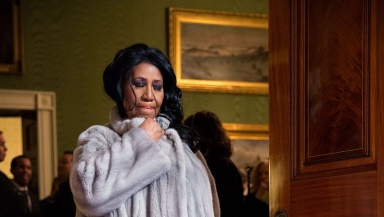
In what would have been her 80th year, the BBC is paying tribute to Aretha Franklin with a series of radio and television programmes. They include a live Prom concert from the Royal Albert Hall featuring Aretha's music. Jules Buckley, who has overseen some of the most innovative concerts at the Proms, conducts the orchestra, while American singer, Sheléa, sings a selection of Aretha's greatest songs.
Born in 1942 in Memphis, Tennessee, Aretha was the fourth child of Rev CL Franklin and Barbara Siggers, a gospel singer herself. Franklin, a celebrated preacher and a friend of Martin Luther King, was a star in his own right and one of the most famous Black preachers in America. He recorded a string of LPs of his sermons, and if you listen carefully to Aretha's vocals, you can hear echoes of this in her singing.
Black preachers in America in the 1940s and 50s were also notable singers and would pepper their sermons with gospel songs. Aretha, who by the age of 14 had already recorded her first album, Songs of Faith, was regularly at her father's side, singing at 'revival meetings' on many of his church preaching tours.
Dubbed the 'Queen of Soul', Aretha sold over 75 million records globally, and won over 18 Grammys and a string of other awards. Yet despite all the praise and accolades Aretha received, she was a troubled soul from the beginning of her life to the end.
Raised as a child prodigy with a famous father, Aretha's home was full of music and the world's greatest gospel singers and Black entertainers were frequent visitors. They included Mahalia Jackson, Clara Ward, Sam Cooke, Dinah Washington, Nat King Cole, Sarah Vaughan, Oscar Peterson, Duke Ellington and Ella Fitzgerald, among others.
Supported by her father, the commercial and secular success of Dinah Washington, Mahalia Jackson, and particularly Sam Cook, profoundly affected Aretha and her father. It's no wonder both had an eye on the 'world'. For a Black Baptist minister, CL Franklin's position at the time was quite remarkable, for the convention within the Black church community was that you did not mix the church with the world, and that Christians in the word of the Bible 'should come out from among them and be separated' (2 Corinthians: 2 v 16).
With a degree of self-interest, no doubt, CL Franklin encouraged Aretha to find secular success as Sam Cooke had done, and who, as a member of the gospel group, 'The Soul Stirrers', regularly accompanied him on his church preaching tours. Knowing Aretha's prodigious talent, CL Franklin also looked for ways he too could make Aretha successful. At one stage, he even thought about Berry Gordy, who was setting up Tamla Motown but dismissed the idea, believing that what Gordy was offering was 'too local' for his daughter.
Deciding that New York was where Aretha needed to be, at 18 she headed for the Big Apple, leaving behind her two children with her grandmother. Living in cheap hotels, Aretha worked in the days doing odd jobs and sang in the evenings when she could. Through a friend of her father, she was introduced to John Hammond, the producer who worked with Bessie Smith, the legendary Blues singer, and had discovered Billie Holiday. Hammond later remarked that when he first heard Aretha, he didn't need convincing, saying she was 'an untutored genius' and the best voice he had heard since Holiday.
Hammond introduced Aretha to Columbia Records and, in 1961, produced her first album. Around the same time, Aretha met Ted White, and although her father opposed the relationship and thought him unsuitable, they were married within six months.
None of the albums Aretha made for Columbia were hits, and the general view is that they were bland and a mixture of too many styles, which failed to capture the 'greatness' of her voice. From Columbia, Aretha moved to Atlantic Records, which was co-owned by Jerry Wexler, and along with Ted White, one good and the other bad; these two were to have the greatest influence on her life, bar her father.
Aretha's time with Atlantic, who also had Ray Charles, Wilson Pickett, Otis Redding, and a cluster of other soul artists, was a very creative and productive period for Aretha. The move produced some of her biggest hits, including, "I Never Loved a Man (The Way, I Love You)", "(You Make Me Feel Like A) Natural Woman", "R-E-S-P-E-C-T", and "I Say A Little Prayer".
Many of these songs were painful expressions of Aretha's turbulent personal life, her early pregnancies, her failed marriages, dealing with fame, the constant tension between her church upbringing and the challenges of being a huge celebrity. "R-E-S-P-E-C-T", it seemed, was a personal plea for due regard, value and esteem which many people believed Aretha was demanding in her personal life.
"R-E-S-P-E-C-T" also became a rallying cry for Black people in America and a demand for equality and justice, something she, along with her father, campaigned for in the marches and civil rights activities they took part in with Martin Luther King.
When asked about what the song meant in this regard, Aretha wrote: "I don't make it a practice to put my politics into my music or social commentary, but the fact that 'Respect' naturally became a battle cry and an anthem for a nation shows me something."
Although Aretha had tremendous secular success and her personal life seemed to be in turmoil, she never strayed far from the church or from God. She was too steeped in both and, in 1972, made a gospel album, Amazing Grace, perhaps as an affirmation of her faith and to give back to the community from where she came and who was a constant support.
Amazing Grace was recorded at the New Temple Missionary Baptist Church in Los Angeles, and over two nights, Wexler, her producer from Atlantic records, recorded a live double album of some well-known gospel songs and a few inspirational ones. Aretha brought in James Cleveland, a mentor to her, along with his famous Southern California Choir and Billy Preston who had achieved enormous success working with the Beatles.
What they and the congregation witnessed at the Amazing Grace recording was Aretha at her comfortable, liberated best. Here she was back in church where she belonged, singing some of her childhood songs and a few inspirational ones. Here she was at home, giving thanks to God, testifying that despite all the turmoil, she could agree with Clara Ward's great gospel song, "How I got Over", marvelling at how she too 'got over'.
Amazing Grace turned out to be Aretha's biggest selling album in her entire 50-plus year recording career. It sold over two million copies in the United States alone, earning a Double Platinum certification. Ironically, it has come to define Aretha's career and life in a full circle.
Although Aretha's life was complicated, full of highs and extreme lows, sadness and despair, achievements, and accomplishments, Aretha sincerely believed in God, and many gospel songs comforted her throughout her life. "Mary, Don't You Weep", "Precious Lord", "His Eyes is on the Sparrow", and "Amazing Grace" are all songs that show God's favour, and Aretha knew that, and knew that it was always there for her. I for one will be watching the special programmes on Aretha on BBC 4, Friday 26 August.
Roy Francis is an award-winning former BBC 'Songs of Praise' producer and the author of 'Windrush and the Black Pentecostal Church in Britain'.













